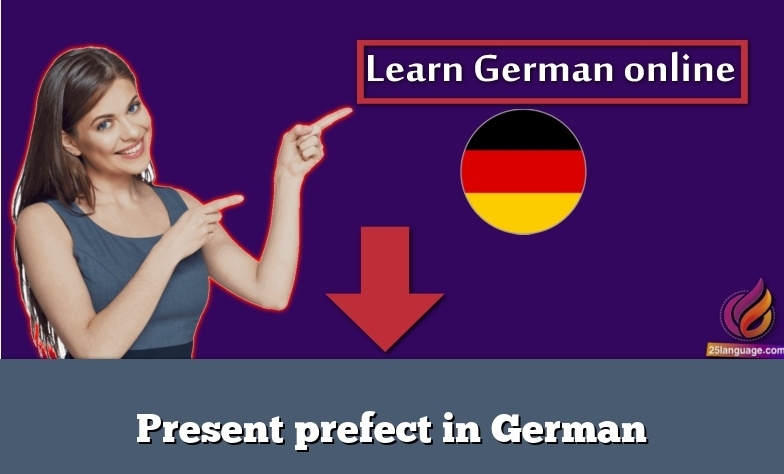Present prefect in German

Present prefect in German, also called present perfect (Perfekt), is a past tense. We use it to speak about actions completed in the recent past.
In spoken German, the present perfect tense is often used instead of the past tense. We can translate the perfect tense using the English simple past tense.
Example
Gestern hat Michael sein Büro aufgeräumt.
Er hat sich vorgenommen, jetzt immer so ordentlich zu sein. Aber bis nächste Woche hat er das bestimmt wieder vergessen
When to use the Present prefect in German
We use the German perfect tense to express:
- a completed action in the past with the focus on the result of the action.
- Example:
- Gestern hat Michael sein Büro aufgeräumt.
-
Result: the office is clean now
- Er hat sich vorgenommen, jetzt immer so ordentlich zu sein.
-
Result: he doesn’t want to be so disorganised anymore
- an action that will be completed by a certain point in the future.
- Example:
- Bis nächste Woche hat er das bestimmt wieder vergessen.
The point in the future must be specifically designated, otherwise we use the future perfect.
How to conjugate the perfect tense in German
To conjugate verbs in the perfect tense we need the present tense form of sein/haben and the past participle (Partizip II).
| Person | sein | haben | ||
|---|---|---|---|---|
| 1st person singular (ich) | ich bin | gegangen | ich habe | gelesen |
| 2nd person singular (du) | du bist | du hast | ||
| 3rd person singular (er/sie/es/man) | er ist | er hat | ||
| 1st person plural (wir) | wir sind | wir haben | ||
| 2nd person plural (ihr) | ihr seid | ihr habt | ||
| 3rd person plural/polite form (sie/Sie) | sie sind | sie haben |
haben vs. sein
The verbs haben and sein are used as auxiliary or helping verbs in the present perfect. Sometimes it can be difficult to know which verb to use. Luckily, there are a few rules for the usage of haben and sein in the German present perfect tense.
We use haben to conjugate the present perfect with:
- verbs that take an accusative object
- Example:
- Michael hat das Büro aufgeräumt.
- verbs without an accusative object that don’t express a change of state or place
- Example:
- Er hat aufgeräumt.
- reflexive verbs
- Example:
- Das Büro hat sich verändert.
We use sein to conjugate the present perfect with:
- verbs of movement that don’t take an accusative object: gehen, laufen, fahren, fallen, fliegen, kommen, reisen, stolpern, stürzen
- Example:
- Alle Kollegen sind in sein Büro gekommen.
- verbs that express a change of state: aufwachen/erwachen, einschlafen, gefrieren, tauen, sterbn, zerfallen
- Example:
- Michaels Ordungsliebe ist erwacht.
- the following verbs: bleiben, geschehen, gelingen, misslingen, sein, werden
- Example:
- Was ist mit Michael geschehen?




























